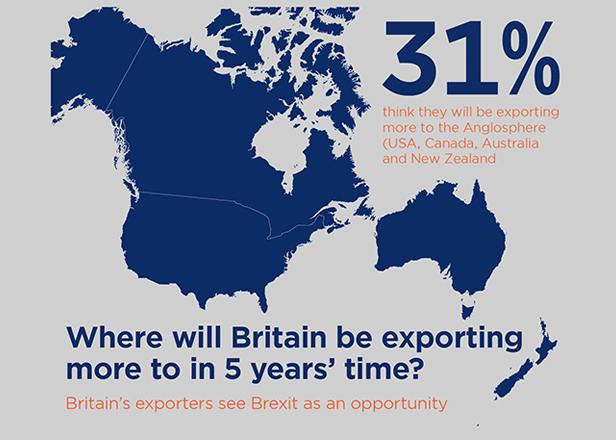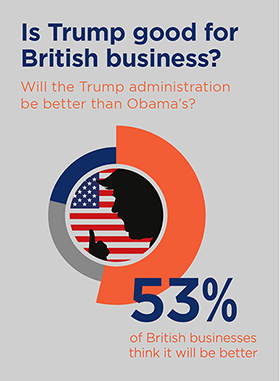September 14, 2018
 Gary Lynch, CEO of GS1 UK, looks at what impact the Trump presidency might have on British businesses exporting to the United States
Gary Lynch, CEO of GS1 UK, looks at what impact the Trump presidency might have on British businesses exporting to the United States
The last two years have been some of the most politically turbulent for British exporters. With the EU referendum, Trump’s election triumph and now the hung parliament, uncertainty is rife. But thankfully, while politicians and pundits squabble, British business is characteristically keeping calm and carrying on. The latest figures show UK manufacturing output is on track for its fastest growth since 2014, with a weaker pound driving overseas demand for UK goods. Despite the uncertainty, when we polled our members, about three-quarters of them said they planned to increase their exporting over the next five years. Whatever happens in politics, the high-end, high-quality products Britain makes will be wanted around the world.
That doesn’t mean the political uncertainty won’t have an impact. It could reduce investment in the economy as businesses lack the confidence to take risks and expand. It could create volatile currency markets which would impact supply chains and export prices. And it could reduce consumer spending, with some choosing to save rather than spend. But this uncertainty also creates opportunity. While there is a lot at risk, the golden prize for the Government would be securing international trade deals which provide a much needed boost to our exports. This would vindicate their policies and show that Britain is open for business.
A trade deal between Britain and United States shortly after leaving the EU would be seen as a huge win for the governments on both side of the Atlantic. Trump and May are suffering in the polls and may not survive until the next elections. Both the Republican and the Conservative parties must gain major policy successes before they face voters again – and an Anglo-American deal is exactly what’s needed. It would vindicate Theresa May for supporting a Global Britain outside the EU. Securing an agreement is just as important for Donald Trump as it would allow him to tout his ability as a deal maker and show he can work with other world leaders.
For business, the benefits would be even greater than for politicians. British companies export more to the US than any other country; selling £96bn of goods to Americans each year. After Brexit, our trade with the EU may decline, but a good trade deal with the US could more than pick up the slack. Our research showed UK businesses are eager to trade with the rest of the world, with 54% believing Britain’s future lies outside the EU. Back in 2015, our fellow English speaking nations (Australia, Canada, New Zealand and the U.S.) made up around a fifth of our exports. But our members expect this to rise after leaving the EU, as nearly a third of the British exporters we surveyed thought they’d be selling more to the Anglosphere in five years’ time.

With both sides of the Atlantic benefiting from a deal, focus should turn to how realistic it is to secure one. Since taking office, Donald Trump wasted no time calling for an era of American protectionism – claiming “protection will lead to great prosperity and strength” in his inauguration speech. Soon after, Trump pulled the US out of the Trans-Pacific Partnership (TPP). But some, including Boris Johnson, think Trump may be more bark than bite when it comes to trade. He claimed to want to crack down on bad trade deals during his campaign podium speeches, but his policies appear more pro-trade now he has been elected. Trump favours trade deals with one country at a time, which could be why Trump has called Britain “smart” for leaving the EU.
 Trump’s relationship with the UK is strikingly different from his predecessor’s. Barack Obama threatened to send the UK to the “back of the queue” during the EU referendum if Britons chose to leave the EU. Trump, quite oppositely, has called Mrs May “my Maggie,” nostalgically referring to Ronald Reagan’s relationship with Margaret Thatcher. When we spoke to our members, they were hopeful about Trump. Only 20% of the businesses we surveyed thought that Trump’s administration would be worse than Obama’s for trade with the UK. And more than half (53%) thought that Trump would be better for Britain – tying in with the political events unfolding.
Trump’s relationship with the UK is strikingly different from his predecessor’s. Barack Obama threatened to send the UK to the “back of the queue” during the EU referendum if Britons chose to leave the EU. Trump, quite oppositely, has called Mrs May “my Maggie,” nostalgically referring to Ronald Reagan’s relationship with Margaret Thatcher. When we spoke to our members, they were hopeful about Trump. Only 20% of the businesses we surveyed thought that Trump’s administration would be worse than Obama’s for trade with the UK. And more than half (53%) thought that Trump would be better for Britain – tying in with the political events unfolding.
After Trump’s visit to Brussels and his decision to pull out of the Paris Agreement, a potential US/EU trade deal is said to be in the “deep freeze,” sending the UK to the front of the queue. EU diplomats have said talks of a deal did not even come up during the President’s visit. US leaders have since affirmed Trump’s desire for a US/UK trade deal. Republican Speaker of the House of Representatives, Paul Ryan, said the US seeks a bilateral trade deal between the two countries and will stand by the UK during Brexit negotiations.
With this in mind, the UK looks like one of the most likely candidates for a trade deal with the US. To support this deal, Theresa May was the first foreign leader to visit the White House during Trump’s presidency. The President has said he wants a “quick deal” and initial talks are set to begin next month. While no deal can be concluded until after Britain leaves the EU, British officials will start to scope out plans for a deal, with the aim of setting up a free trade agreement as soon as possible after Brexit. During her visit, Theresa May also alluded to the possibility of removing trade barriers between the two countries before the UK leaves the EU. Pre-Brexit negotiations, the two countries could make agreements on mutual recognition of professional qualifications, removing red tape and removal of non-tariff barriers blocking UK exports of certain agriculture and food products.
Things seem to be looking up when it comes Anglo-American trade. A deal with the US could yet prove that Britain has a positive trading future outside the EU after all.